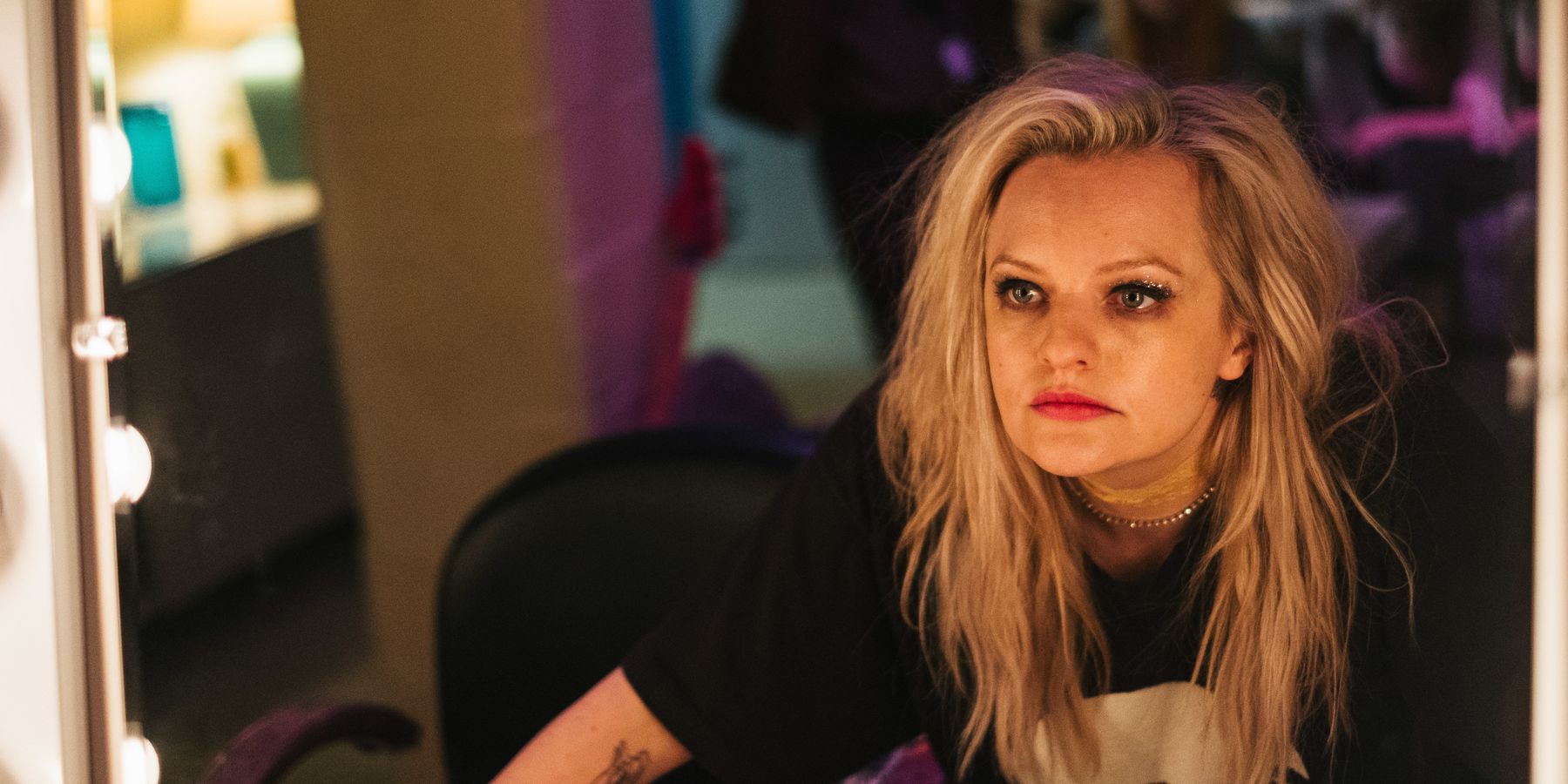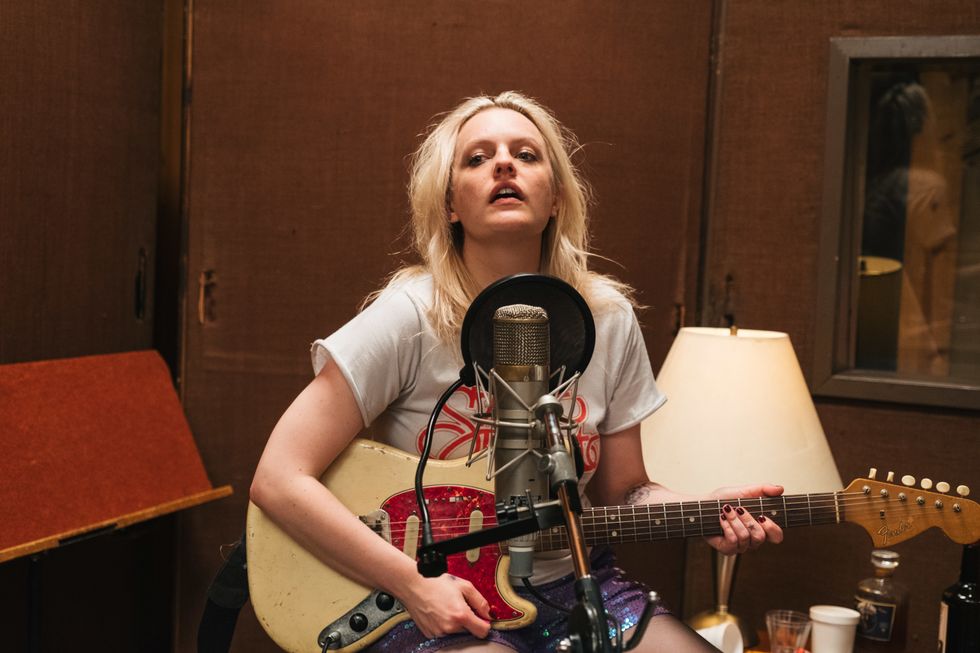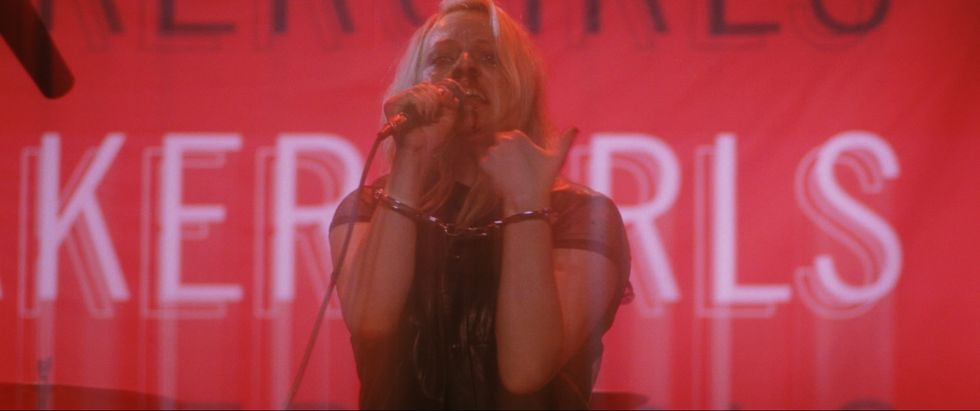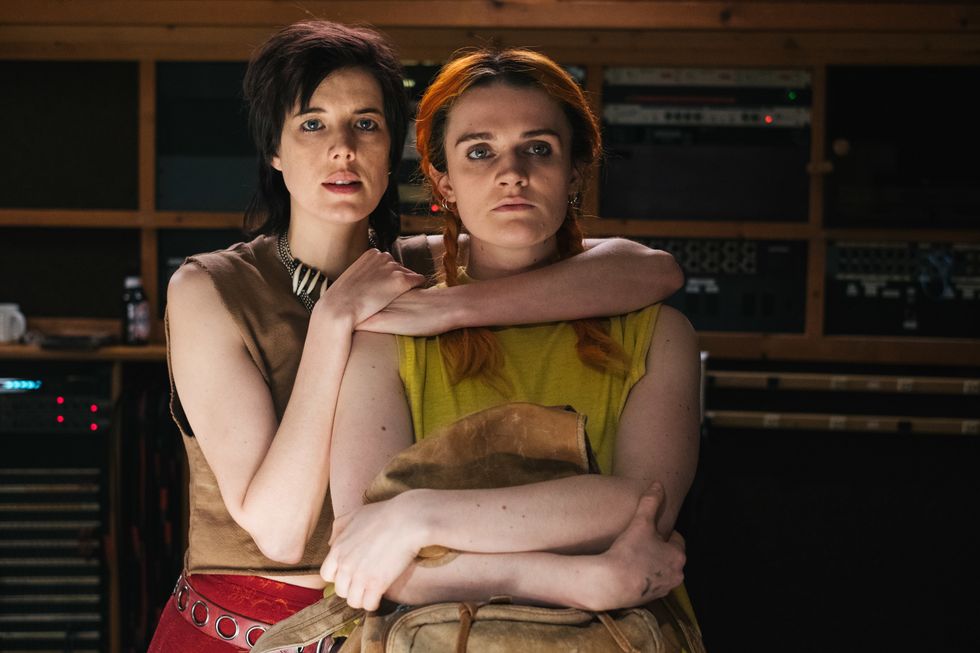
Hollywood loves a tortured genius. Especially if he's in a rock band. The implied gender pronoun is among the reasons why it feels so radical to watch a glitter and mascara-smeared Elisabeth Moss play one in her new film Her Smell.
Directed by Alex Ross Perry, Her Smell sees Moss as 90s-era Courtney Love-Amy Winehouse pastiche named Becky Something, frontwoman of the fictional grunge band Something She. With an ego the size of Texas and charisma to match, over the film's 90 minutes, Becky swaggers, wreaks havoc and pontificates her way into your heart.
She also gobbles up the life-force of everyone around her, from her bandmates (Agyness Deyn, Gayle Rankin) to her mother to her wannabe protégés The Acker Girls (Cara Delevingne, Ashley Benson, Dylan Gelula), who the label picks up to offset the costs of Something She's perpetually delayed record. Becky takes credit for her band's success, blows their royalties on a fraud shaman, passes out drunk holding her infant daughter and at one point, tries to stab one of her bandmates. One by one, they all leave. It's not an easy watch.
The rare permission Moss' Becky is given to rant and rave — to be as epic and absurd and depraved as the guys — is gratifying, for sure. But it never feels good. The abrasive, eponymously pungent film goes down like a gulp of glass shards, in comparison to a movie like A Star Is Born's hot chocolate.
Related | The Rise of the Vulnerable Heroine
Unlike most film heroes of her ilk, Becky has to face the unsexy consequences (bankruptcy, lawsuits, child support, bad skin) of her destructive antics, but she's also not cartoonishly wretched. Thanks to Moss's superb performance and Ross Perry's brutal script, Her Smell nimbly navigates the line between moralistic cautionary tale and triumphant martyr story. They manage the tricky task of acknowledging larger-than-life female genius, without mistaking progress for changing the pronouns in a story about bad behavior.
To the film's credit, Becky has to stick around and clean up her mess instead of being granted a swift, poetic exit (which she romanticizes for herself: "I always thought I'd die on stage"). Her Smell actively shuns most of the pleasurable clichés of the tortured genius genre: the rise-to-fame, the glory days montage, the drug benders. Becky's already a creatively-blocked addict when we meet her, and spends most of the movie backstage, screaming horrible things at people who love her. The film ends with a tense reunion show which sees her start to make amends, and imagine a life that won't end in flames.
Moss was responsible for bringing to life this relentlessly human character who, despite her patchwork inspirations, we've never seen on-screen before.
PAPER spoke with Moss about rock and roll, 90s nostalgia and playing unlikeable women.
You've said you weren't into Riot Grrrl or punk growing up. What was your perception of it before Her Smell and what was your perception after wrapping the shoot?
I was the generation afterwards, you know — the Britney Spears, *NSYNC generation. So my perspective of it was that it was music for teenagers who were way cooler than me. And not even like the Riot Grrrl movement, I'm talking about, like, Nirvana, Oasis. The Riot Grrrls, I don't think I even knew about [them] when I was like ten or eleven. So, preparing for the film was such an interesting education and a learning curve. It's the kind of music that is so specific to that time that you really do feel like you learn so much about that time period, the 90s, that era just from that music alone.
What did you learn about the 90s?
Just the dissatisfaction, the sense of anger, of pain. Especially young people: they were dissatisfied, no one was listening to them. Especially from the women in the Riot Grrrl movement, they were just as hardcore and just as punk as the men, if not more sometimes honestly, and they had so much to say and put it in their music. There's a full resistance that was happening from just that group of women and just that group of music.

I feel like there's more and more nostalgia for that era that you portray — Bikini Kill is going on tour and L7's putting out an album. Why do you think that is?
Perhaps we're just on schedule, like we went through the '80s and are moving forward. It wasn't until recently that we were able to be nostalgic about the early '90s. The people who lived through that time are now old enough to have some introspection about it, to look at it as something that was epic. As we look at our own lives right now, it doesn't seem that exciting, it doesn't seem like anything that's really particular to the era or the generation. But when you look back, you're able to go, "Oh, that was so of that time."
How did you become Becky Something? What was that preparation like?
I did the usual, watching a lot of documentaries and music videos. But I didn't just focus on the music scene. I focused on anything drug-related I could get, you know. I watched the Amy documentary [about Amy Winehouse], we watched the Oasis documentary, we watched a lot of Marilyn Monroe stuff. The Andy Kauffman, Jim Carrey documentary, which was really interesting and really influential to me. It just kind of came out and I watched it at the exact right time. And you know, that person that Andy Kaufman created, that persona, that thing that he created that was for everyone else, I thought was very Becky. That way you kind of couldn't tell — was it all an act? Or was it intentional? Was he actually on a different plane than the rest of us?
I read you watched videos of drug users and addicts.
Yeah for sure. I watched a ton of YouTube videos, because I didn't want to just…of course I tried to look for movies that had similar performances in them. And I watched Boogie Nights and Goodfellas and Wolf of Wall Street. But I didn't want to just copy what another actor had done. I wanted to watch real videos of real people, specifically on meth, which there's surprisingly a lot of videos out there. I wanted it to be as realistic as possible.
"I didn't want to just copy what another actor had done... I wanted it to be as realistic as possible."
You've said Becky was one of the hardest roles you've ever played. Why?
I would say a couple things. One, the energy that it requires — there's no middle ground with Becky. She's either going 100 miles an hour, or she's completely stuck in the mud. There were no scenes or moments that were like, "Oh, this is kind of easy, I'll just take it easy on this one." There was a lot of insane dialogue that I had to know that didn't make a lot of sense and if I messed up and said the right word, it wouldn't make sense. Alex was really specific about it, and wanted these lines to be really specific. He wanted it to be perfect, so that was another interesting challenge, just that language that she speaks in is so unusual.
It's crazy to hear that so much precision went into those diatribes. They feel so spontaneous.
They were extremely precise, because Becky is extremely smart, she's very intelligent. Her references are right on, she has an encyclopedic knowledge of pop culture. Even her cruelty is very specific. It's not a rambling voice, it's not a monologue, it doesn't go nowhere, it's so, so specific. There were no dialogue changes, no ad lib, no improv, it was all deliberate.

What do you think is Her Smell's contribution to that conversation about the trope of the mad genius?
There's certain people that just, sort of, exist on a different plane. They need more stimulation, they need more attention obviously. I think we're all familiar with them. At some point we've all met that person who has this insane combination of extreme confidence and no self-esteem. It makes a very toxic, terrible combination. And Becky just doesn't know how to be socially acceptable. She's this crazy storm, and also, a brilliant artist. She's a genius, and she knows she's a genius.
Do you think part of the project of the film was to demonstrate or explore that women get to play those roles and are entitled to that story too?
Absolutely, yeah. If Becky was a man, I don't know what the story would be. It would be like, "Okay, what's the point?She's just like every other rock star musician that we've ever heard of." But as a woman and a mother, it becomes unusual or at least what we think of as unusual, but it wasn't. The truth of that era and that music was, like I said, the woman were rougher than the men, more hardcore. Becky is almost genderless in a way. She doesn't use her sexuality or identify with it to get her anywhere. She doesn't rely on that all. She doesn't shy away from it, but it just doesn't matter to her, nor does it kind of matter to everyone else.
You often play unlikeable women. Do you seek out those roles, or do they come to you?
I think it's probably a combination. I'm more challenged by and attracted to conflict and drama and that's more interesting to me. As far as unlikeable… that's an interesting question. It's an interesting concept. It's never a part of my thought process, I don't think about whether or not somebody like Becky is likable or unlikeable. My job is to help you to understand her, not like her. As far as if I like her, I don't make a judgement either way. The only way that that would enter my thought process, is in the sense of "does the character like themselves?" But to be honest, I usually like them, because I find something I identify with in them. I'm in their heads, I understand why they do the things they do and behave the way they do, and that makes me like them.
"I don't think about whether or not somebody like Becky is likable... My job is to help you to understand her, not like her."
Have you ever gotten to play a righteous, beloved heroine?
I'd say June from Handmaid's Tale is close. She's a pretty straightforward heroine. But she's also flawed and interesting and complex, and doesn't always do the right thing. I think that's true of people, unless you're literally like a superhero or something, from a comic book movie, I don't know if there are people that are completely perfect, who do the right thing all the time.
People have been positioning Her Smell as a foil to A Star Is Born. What do you make of the comparison?
If anything, Alex and I have a joke: "If you like, A Star Is Born, you'll love Her Smell" because they're obviously so, so different. Basically, it's not true at all... If you like A Star Is Born, maybe you'll hate Her Smell [laughs]. That was the big challenge, to do a unique take on the story of a rock star and an addict. That was why we wanted to start at the point of her demise, and not bother with her rise to fame, and not bother with how she was discovered and all that, because... then we'd be making A Star Is Born! They already did that.
There's also almost no on-screen drug use. Was there a conversation about that?
Yeah, that was a very conscious decision. The whole question with this story is, what are we going to do that hasn't been done? How are we going to show it? What, are we gonna have them doing coke off the table, and shoot it from underneath the table, through the glass? It's all been done. We've seen it all. And it's also not what the movie's about. The movie's about this woman who — firstly, sometimes is probably not on anything — and is just acting like that because it's fun. The choice gave us freedom. Like if we show her popping a pill then we have to follow up on that for the next 20 minutes. Instead, we were able to be like, "Well, I don't know, she could have been on a bender for five days." There are moments when she maybe gets into a back room or whatever, but without actually showing these cliché boring drug scenes, we were able to do whatever we wanted.

You produced Her Smell, and you executive produce on Handmaid's Tale. What has working as a producer been like?
I also produced Queen of Earth, my last film. God, at this point, [I've produced] two music videos, another film last summer that was after Her Smell. Producing is a very normal part of my job and my life now. It just gives me an entirely new and deeper perspective on the entire project. It's hard for me now to be involved in something that I'm not a producer on; especially if I'm the lead in something, it feels like I'm cutting off one of my arms. It's not about control, but to not have that collaboration, to not have that discussion or to be involved in the various elements that happen before you start filming, I feel like I'm viewing something from the outside, rather than the inside when that happens. It's something that's such a seamless part of my normal day job (acting), they go so hand-in-hand now.
Have you ever thought about directing your own films?
I've thought about it more recently than I have in the past. But I'm also really happy with acting and producing. I would want it to be a story that I really wanted to tell and only I could tell it as a director. I don't think I've found that yet. I've thought about directing on Handmaid's at some point, as a start, because obviously I'm so familiar with the show already. Maybe I'll do that, but I don't know, I already have [laughs] a lot to do.
Photos courtesy of Gunpowder & Sky